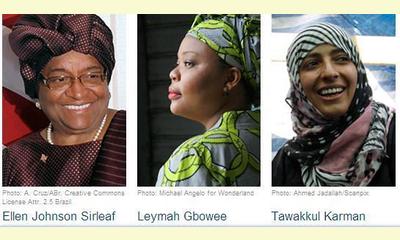|
|
The Nobel Peace Prize for 2011
un articulo por The Norwegian Nobel Committee
The Norwegian Nobel Committee has decided that the Nobel Peace Prize for 2011 is to be divided in three equal parts between Ellen Johnson Sirleaf, Leymah Gbowee and Tawakkul Karman for their non-violent struggle for the safety of women and for women’s rights to full participation in peace-building work. We cannot achieve democracy and lasting peace in the world unless women obtain the same opportunities as men to influence developments at all levels of society.

click on photo to enlarge
In October 2000, the UN Security Council adopted Resolution 1325. The resolution for the first time made violence against women in armed conflict an international security issue. It underlined the need for women to become participants on an equal footing with men in peace processes and in peace work in general.
Ellen Johnson Sirleaf is Africa’s first democratically elected female president. Since her inauguration in 2006, she has contributed to securing peace in Liberia, to promoting economic and social development, and to strengthening the position of women. Leymah Gbowee mobilized and organized women across ethnic and religious dividing lines to bring an end to the long war in Liberia, and to ensure women’s participation in elections. She has since worked to enhance the influence of women in West Africa during and after war. In the most trying circumstances, both before and during the “Arab spring”, Tawakkul Karman has played a leading part in the struggle for women’s rights and for democracy and peace in Yemen.
It is the Norwegian Nobel Committee’s hope that the prize to Ellen Johnson Sirleaf, Leymah Gbowee and Tawakkul Karman will help to bring an end to the suppression of women that still occurs in many countries, and to realise the great potential for democracy and peace that women can represent.
|








|
DISCUSSION
Pregunta(s) relacionada(s) al artículo :
The Nobel Peace Prize for 2011, What is its historical significance?
* * * * *
Comentario más reciente:
:
In recent weeks, our loss of the first African woman to win the Nobel Peace Prize (Wangari Maathai), has been compensated by the Nobel Peace Prize to two more African women, Ellen Johnson Sirleaf and Leymah Gbowee, as well as Tawakkul Karman from nearby Yemen.
For a reflection on Wangari Maathai see CPNN October 3, 2011 and for her election in 2004, see CPNN - October 31, 2004.
In awarding this year's Prize, the Nobel Committee specifically mentions Resolution 1325 of the UN Security Council which called for an increased role of women in peacekeeping and peace negotiations.
Readers of CPNN will know that this important resolution, adopted ten years ago, has only begun to be implemented. See CPNN August 11, 2011 and its discussion, as well as CPNN March 6, 2004 and its discussion.
It is no accident that the adoption of Resolution 1325 in 2000 was the work of Ambassador Anwarul Chowdhury who, one year earlier had assured the adoption of the UN Resolution on the Culture of Peace. Although the Nobel Committee does not use the phrase "culture of peace" in their recent announcement, we may consider that the prizes to these women mark a new direction of the Nobel Prize, not so much for the ending of particular wars (the old concept of peace) but for the deep transition from the culture of war to a culture of peace.
As stated in the CPNN discussion Do women have a special role to play in the peace movement?:
"there is an inextricable linkage of peace with equality between women and men. Only this linkage of equality, development and peace can replace the historical inequality between men and women that has always characterized the culture of war and violence . . .
"Looking back over history, as well as prehistory, one can see how it has been the culture of war that has perpetuated male domination . . .
The Nobel Prize of 2011 to Ellen Johnson Sirleaf, Leymah Gbowee and Tawakkul Karman as well as those of 2004 to Wangari Maathai and 2003 to Shirin Ebadi recognize the leading role that women have been playing in all the areas of the culture of peace, especially peace education, sustainable development, human rights, democratic participation, and tolerance and solidarity, not to mention women's equality. In general, we may state that the global movement of a culture of peace is being led by women; one among many signs of this is the fact that a majority of CPNN articles are written by women and concern activities being led by women.

|
|








